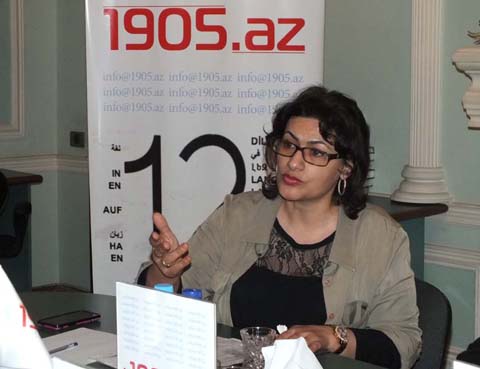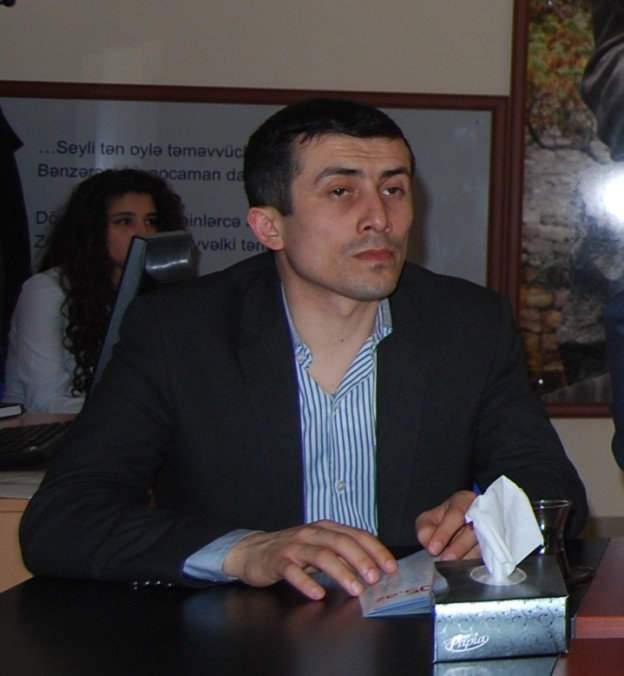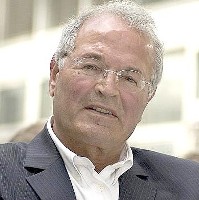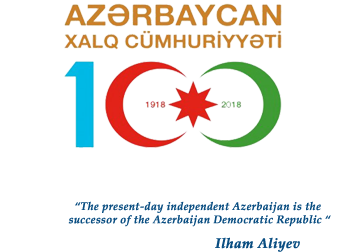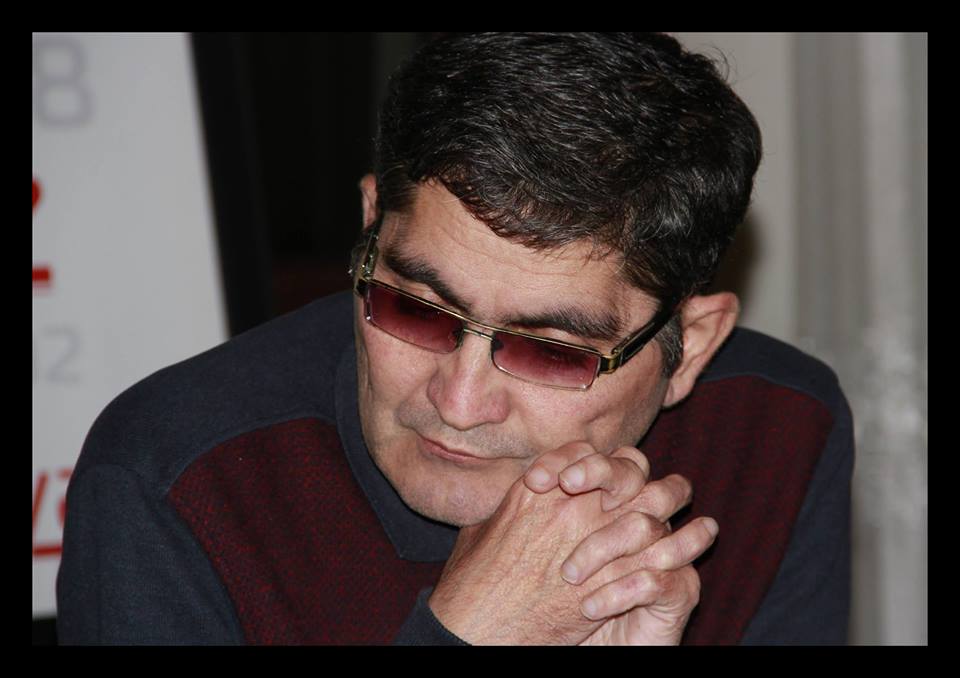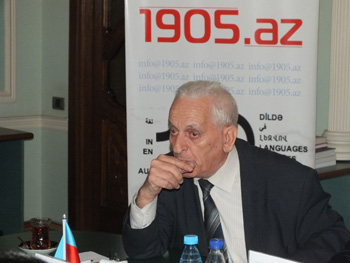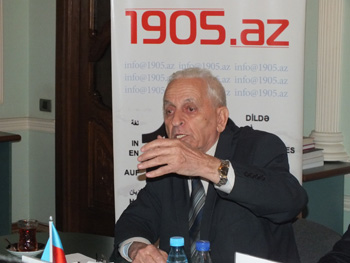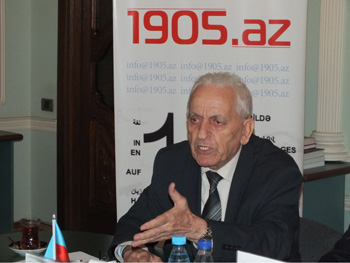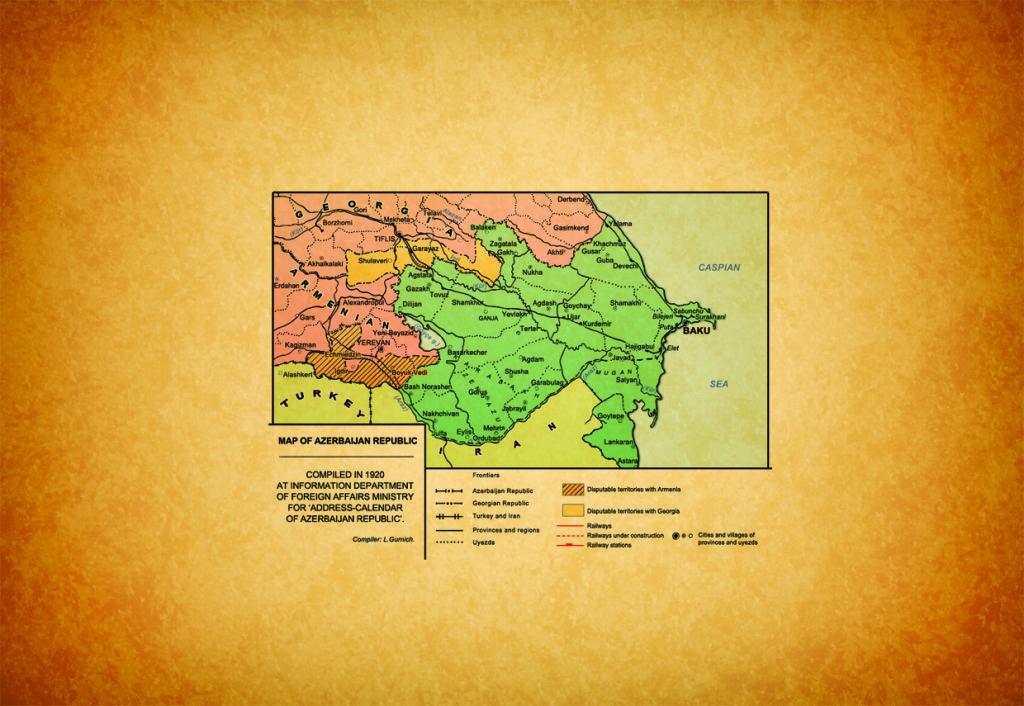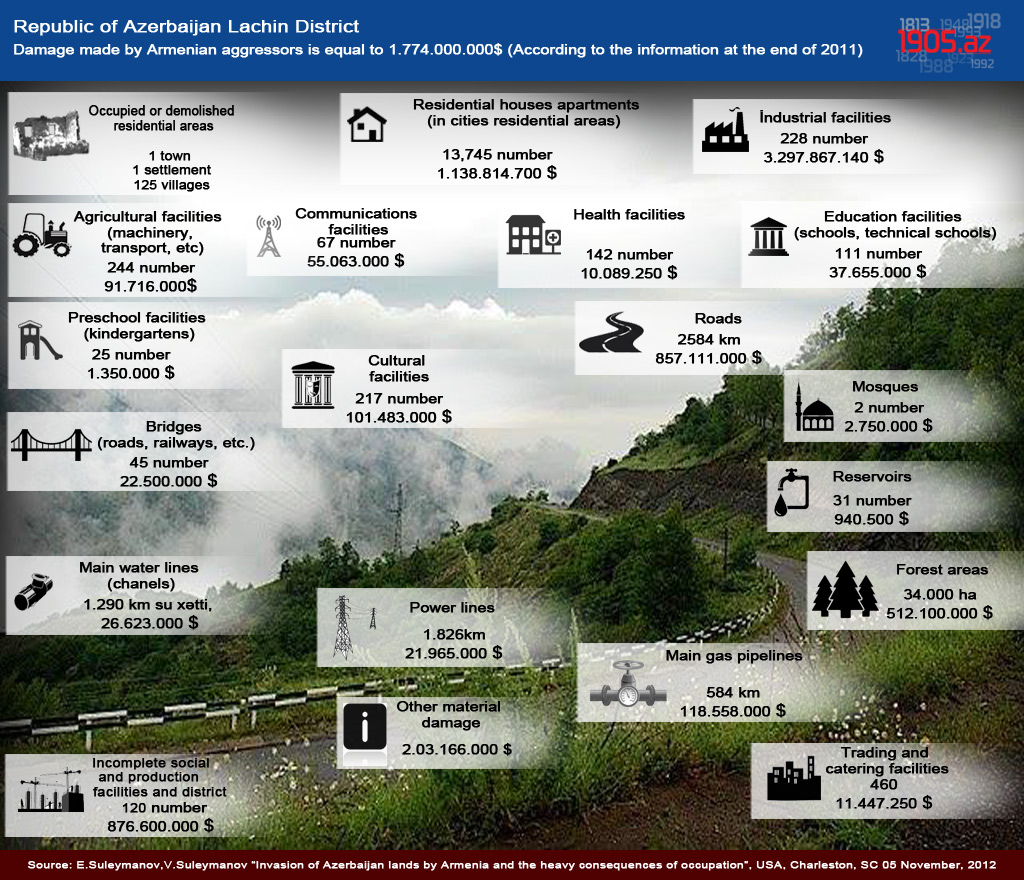President of the Republic of Azerbaijan Ilham Aliyev has received Chairman of Azerbaijan Railways Closed Joint Stock Company Javid Gurbanov.
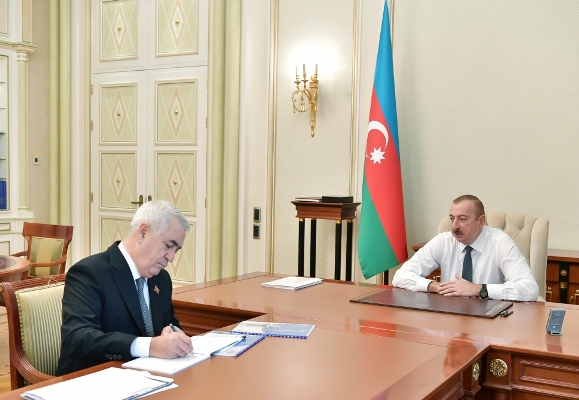
Touching upon the work carried out in relation to railways in Azerbaijan in recent years and future objectives, President Ilham Aliyev said:
– Major investments have been made in the railway infrastructure in recent years. Because of this investment, the infrastructure has been significantly developed. It is no coincidence that the latest report of the Davos World Economic Forum ranks Azerbaijan in 34th place in the world for the level and quality of railways. This is a fairly high indicator, a reflection of the work done in recent years. I should also add that in terms of the level of transport infrastructure, we are in 31st place in the world. In other words, the entire transport infrastructure in Azerbaijan is being upgraded and modernized. A new trading port was commissioned last year, the historic railway Baku-Tbilisi-Kars in 2017, internal railways are being modernized. In a nutshell, our high place in the Davos ranking does reflect the reality. However, in parallel with this, we need to continue to pay more attention to this area because the successful development of our country also depends on the transport infrastructure.
Today, Azerbaijan provides services as a reliable transit country. According to the general opinion, which is reflected in the reports of international organizations, Azerbaijan has become a reliable and important transit country. I have repeatedly said that for each country to be able to develop its transport potential, first of all it has to maintain good relations with neighboring countries, and it is a reality today. Over the past few months alone, I met with the leaders of four neighboring countries – the President of Russia, the President of Turkey, the President of Iran and the Prime Minister of Georgia. During these meetings, sufficient attention was also paid to our cooperation in the transport sector. In short, in the future, our transit potential will further serve the development of the non-oil sector. The role of the transport sector in increasing the share of the non-oil sector in the gross domestic product is increasing. At present, we are making broader use of the Baku-Tbilisi-Kars railway. Last year, about 300,000 tons of cargo were transported. Most importantly, we are no longer content with the goods coming only from Asian countries. We actively cooperate with Europe. Some European countries are already using this road. We have already started receiving container trains from China. The China-Kazakhstan-Azerbaijan-Europe corridor is functioning. In addition, goods have also been transported in the direction of Afghanistan-Turkmenistan-Azerbaijan-Europe lately. We have managed to connect the Lapis Lazuli railway with Baku-Tbilisi-Kars. This ushers ample opportunities. During my meetings with the presidents of Central Asian republics, a fairly broad exchange of views was held on railway transportation. We are currently discussing the possibility of Uzbekistan and Tajikistan using our corridor. I am sure that success will be achieved in this direction as well.
In other words, I want to say that the Baku-Tbilisi-Kars railway, once launched on the initiative of Azerbaijan and implemented with our major financial support, is very important. When we were laying the foundation of the railway earlier, I said that this project would redraw the transport map of the world, that it would turn Azerbaijan, which has no access to the world ocean sea, into an international transport hub. At the same time, we have been paying great attention to the North-South transport corridor. All work in Azerbaijan has been completed, including the completion of the construction of the railway to the border with Iran two years ago and the construction of a railway bridge. The North-South corridor is currently operational. In 2018, the volume of goods transported along this corridor increased eight times and by a further 70 percent in nine months of this year. So there is great potential. Also operational is the North-West transport corridor. Cargoes coming from Russia, as well as Iran, are being transported westward through the territory of Azerbaijan. Many countries are involved in the North-South and East-West transport corridors, but Azerbaijan is the only country participating in both projects and making a valuable contribution to their implementation. This will bring us both political and economic dividends in the future, as it already does. Cooperation in the field of railway transport brings countries closer together, strengthens their security, develops the situation in the region in a more positive direction and brings great economic dividends to each country.
At the same time, on my instructions, steps are being taken to build and modernize domestic railways, including the construction of the Baku suburban railway. This railway will link Baku settlements to the city center. In addition, the project to build a railway to the city of Gabala, one of our tourist centers, is ongoing. In Soviet times, there was no railway to Gabala and it wasn’t necessary, but there is a great need for it now. When I put forward this initiative, some thought it was not necessary. However, during a recent visit to Gabala, I was informed that in nine months of this year, 150,000 tourists visited the city. And this includes only those staying in hotels. If we take into account the tourists staying in houses they rent on an individual basis, it will be another 150,000 people. So 300,000 tourists visited Gabala in nine months. There is one road leading to Gabala – the Shamakhi-Gabala road. On my instruction, it will also be reconstructed. Of course, this road will not be able to cope with the growing tourist traffic. Therefore, the construction of the railway from Laki to Gabala is of particular importance.
In addition, although the North-South transport corridor is functioning, we can’t be pleased with the condition of the Baku-Yalama and Alat-Astara railways because they were not repaired. These railways must be reconstructed so that train speeds increase. Currently, trains run at a speed of about 40, maximum 50 kilometers per hour. This prevents the transportation of large cargo and provision of high-quality services to passengers. Therefore, our goal is to modernize the railway section of the East-West and North-South corridors. We must make sure that trains can run at a speed of at least 140 kilometers per hour. The modernization of the Baku-Yalama and Alat-Astara railways has already begun.
Therefore, I have invited you to receive an update on the work done. What will be done before the end of this year and, most importantly, what work is on the agenda for next year because the investment program for next year must envisage the construction of railways. Please update me on that.
Chairman of Azerbaijan Railways Closed Joint Stock Company Javid Gurbanov said:
– Thank you, dear Mr. President. Of course, this work is hard to overestimate. Over 15,000 kilometers of roads, bridges, airports have been built in our country, including the railways of Azerbaijan, which have experienced a revolution, as it were, have been renewed. All this is thanks to your support and special care.
First of all, let me inform you about the Baku Circular Railway. This road, which previously existed under the name of “electric train”, did not operate for many years. In the past 25 years, there were simply 5-10 electric trains that had worked for more than 40 years and exceeded their service life.
On your instruction, we began the construction of this road. Its total length along with access roads is about 200 kilometers. The roadway has been unserviceable for many years. According to your instructions, for the convenience of people, we have moved all junctions from being same-level to different-level. It can be called the Absheron Circular Railway because this railway links the entire Absheron, including the city of Khirdalan. Eighty percent of the work on the railway and 70 percent of the work on electricity, communications and signs has been completed here, and 11 new modern stations have been built. Eighteen pedestrian crossings and six road crossings have been built across the road. We have removed wastewater along the entire path.
The first part, i.e. the road that makes up the Absheron circle – the road from Baku, Bilajari, Khirdalan, Sumgayit, and from there Novkhani, Fatmai, Mahammadi, Zabrat-1, Zabrat-2, Zabrat-3, Sabunchu, Bakikhanov, Koroglu and finally Baku – will be finished before the end of the year.
President Ilham Aliyev: Before the end of the year, good.
Javid Gurbanov: At present, 12,000 passengers use the Baku-Sumgayit railway every day. We believe that upon completion of construction we will be able to transport approximately 25,000-30,000 passengers.
President Ilham Aliyev: This is a more convenient form of transport. In addition, people will be able to reach their destination, their work places quickly, because there are a lot of traffic jams on highways today. True, numerous roads, new bridges, new road junctions have been built, but there are still traffic jams at the rush hour. So this railway will bring people comfort and also reduce the burden on the road. All the projects planned should be completed by the end of the year. This work will be continued next year.
What can you say about the Baku-Sumgayit railway and its importance? How many passengers are being transported along this road in general?
Javid Gurbanov: This railway already transports 12,000 passengers daily.
President Ilham Aliyev: 12,000?
Javid Gurbanov: Yes, 12,000. But after it is opened, when the roads leading to Sumgayit from this side are opened, as well as those coming from the opposite side, when bus traffic is regulated, this figure will be 25,000-30,000. And this will probably reduce the work of at least 300-500 buses. These are environmentally friendly and high-speed trains of a good level. They have all the amenities. Besides, travel time has been reduced in half or by two thirds.
President Ilham Aliyev: Yes, I traveled along this railway. It is very comfortable.
Javid Gurbanov: We also want to increase the speed to 140.
President Ilham Aliyev: Modern “Stadler” carriages have also been purchased, they are functioning.
Javid Gurbanov: Yes, they all are.
President Ilham Aliyev: How does the Baku-Ganja railway work? During my last visit to Ganja, I promised to the people of Ganja that the road would operate, and it is already operational. We plan to ensure the operation of these cars from Ganja to the border with Georgia, so that people living in border regions can also take advantage of that.
Javid Gurbanov: Currently, there is one train departing and one train arriving.
President Ilham Aliyev: How long is the trip?
Javid Gurbanov: Four hours, Mr. President. But we are not pleased with that. The infrastructure of our railways, as you said, allow us the opportunity to increase the speed to 140. This means that we can reach Ganja in three hours.
President Ilham Aliyev: In three hours?
Javid Gurbanov: Yes.
President Ilham Aliyev: Great!
Javid Gurbanov: After your instruction, we tackled this issue again. Work on the railway from Ganja to Agstafa is fully completed now. There were about 112 overpasses, and we have already completed 67 of them. We expect to ensure that a trip to Agstafa takes four and a half hours. And to Ganja no later than three and a half hours. Thus, on your instructions, the comfort and approval of passengers will be fully ensured.
President Ilham Aliyev: From now on, people will travel by rail, as it is convenient, safe and also beneficial in terms of distance and time. What is the status of the construction of the Laki-Gabala railway?
Javid Gurbanov: The construction of the Laki-Gabala road continues. The length of the road is 46 kilometers.
President Ilham Aliyev: But earthwork is now under way, isn’t it?
Javid Gurbanov: Yes, we are carrying out earthwork, have already laid 11 kilometers of tracks. There are 100 artificial structures. We have already placed all 100 – bridges, support piles, etc. Work continues.
President Ilham Aliyev: When will it be ready?
Javid Gurbanov: According to our calculations, by the middle of next year, around August-September, it will be ready for operation.
President Ilham Aliyev: Try to put into operation before the summer season, because more people travel to this region in the summer months. So do try to finish it before the summer season.
Javid Gurbanov: Of course, Mr. President. Sixty percent of our railways were electrified in Soviet times. They are located in the Zagatala-Gabala and Astara zones. After your instruction, we ordered two to three diesel trains for these roads. Two more of our new trains are arriving. To test the trains which will operate to Gabala, they will be launched on the Ganja Railway.
President Ilham Aliyev: Good. What is being done on the Alat-Astara railway?
Javid Gurbanov: As for the Alat-Astara railway, at that time you ordered to build this line at a distance in order to preserve the beauty of the city of Lankaran, its proximity to the sea and the environment. Today we are working on this railway. All design work has been done. As you said, a 17-kilometer stretch of the Astara-Astara railway has already been built. A bridge has been erected, and on our side there is our large terminal. It is functioning today. By the end of the year we will build seven to eight more lines. After the construction of tracks, we will have to build an automobile terminal there. Apparently, it will be built on our territory there. Rail transportation has increased; today there is a great interest in this.
President Ilham Aliyev: Yes, we must definitely reconstruct this railway. First, the existing road can’t cope with the increasing freight traffic. This is a fact, and the speed is extremely low. The track runs along the sea, it is dangerous and also inefficient in terms of time. On the other hand, Lankaran today is a region with great tourism potential. Hotels and recreation areas have been built there in recent years. We have reconstructed the Baku-Lankaran highway. It is possible to say that this road does not enter any city and is approximately 60-70 kilometers shorter. So people are using it quite comfortably. Therefore, the transfer of this railway from the coast in the other direction is of great importance, of course. The coastal zone of Lankaran will also be open to tourism. Entrepreneurs and investors will come and build hotels there, because there is a beautiful coastal zone there, and we need to take advantage of that.
In addition, on my instruction, work is currently under way on the Baku-Yalama railway. We need to accelerate the construction of this railway as well, first of all, for the North-South transport corridor. At the same time, it is necessary to build a railway to another resort area of ours – Gusar district. It wasn’t built even in Soviet times. I have issued the instruction to address these issues as well. What has been done in this direction?
Javid Gurbanov: Mr. President, the length of the Bilajari-Yalama railway is 348 kilometers. The World Bank and the French Development Agency have already determined the budget. We worked together with the Ministry of Finance and the Ministry of Economy. Loans have already been completed. We will begin the construction of the railway probably in December or January. This applies to one stretch of the railway. The rest has been allocated from the budget on your instruction. Five new large substations have already been built there. We have done work related to electricity, communication lines, and are also laying fiber-optic cables. Construction work will begin next year and will last approximately two years.
President Ilham Aliyev: Yes, great attention should also be paid to this line. Thus, we will significantly increase the efficiency of the North-South transport corridor.









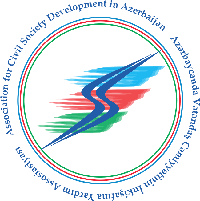
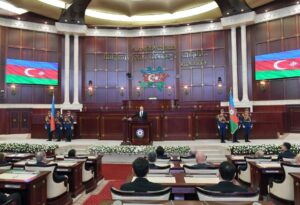 Inauguration ceremony of President of Azerbaijan Ilham Aliyev was held
Inauguration ceremony of President of Azerbaijan Ilham Aliyev was held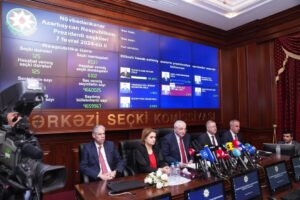 Ilham Aliyev wins presidential election with 92.05 percent of votes VIDEO
Ilham Aliyev wins presidential election with 92.05 percent of votes VIDEO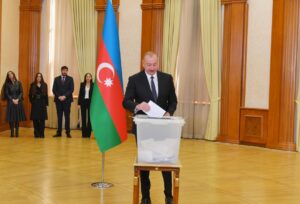 President Ilham Aliyev, First Lady Mehriban Aliyeva and family members voted in Khankendi VIDEO
President Ilham Aliyev, First Lady Mehriban Aliyeva and family members voted in Khankendi VIDEO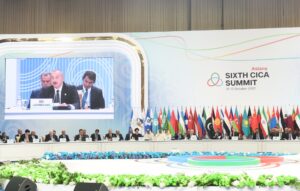 Plenary session of 6th Summit of Conference on Interaction and Confidence Building Measures in Asia gets underway in Astana. President Ilham Aliyev attends the plenary session VIDEO
Plenary session of 6th Summit of Conference on Interaction and Confidence Building Measures in Asia gets underway in Astana. President Ilham Aliyev attends the plenary session VIDEO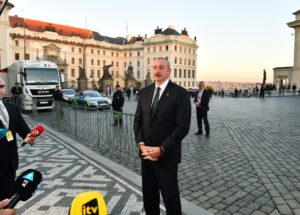 President Ilham Aliyev was interviewed by Azerbaijani TV channels in Prague VIDEO
President Ilham Aliyev was interviewed by Azerbaijani TV channels in Prague VIDEO



